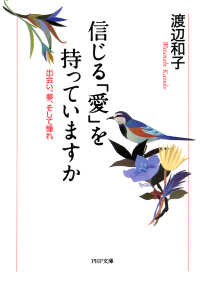- ホーム
- > 洋書
- > 英文書
- > History / World
Full Description
This book traces the development of 'community archaeology', identifying both its advantages and disadvantages by describing how and why tensions have arisen between archaeological and community understandings of the past. The focus of this book is the conceptual disjunction between heritage and data and the problems this poses for both archaeologists and communities in communicating and engaging with each other. In order to explain the extent of the miscommunication that can occur, the authors examine the ways in which a range of community groups, including communities of expertise, define and negotiate memory and identity. Importantly, they explore the ways in which these expressions are used, or are taken up, in struggles over cultural recognition - and ultimately, the practical, ethical, political and theoretical implications this has for archaeologists engaging in community work. Finally, they argue that there are very real advantages for archaeological research, theory and practice to be gained from engaging with communities.
Contents
List of figures
Abbreviations
Acknowledgements
Introduction
1. Heritage, communities and archaeology: a history
2. Material culture, memory and identity
3. Community dissonance
4. Having a stake
5. Museums and communities
6. Digital communities
7. Conclusion: working together
Notes
Bibliography
Index
-

- 電子書籍
- 飯屋の娘は魔法を使いたくない?【単話】…
-

- 電子書籍
- 勇者伝説の裏側で俺は英雄伝説を作ります…
-

- 電子書籍
- ウサギコットン100% 2巻 楽園
-

- 電子書籍
- 中原くんの過保護な妹 2 バンブーコミ…
-

- 電子書籍
- 信じる「愛」を持っていますか - 出会…



